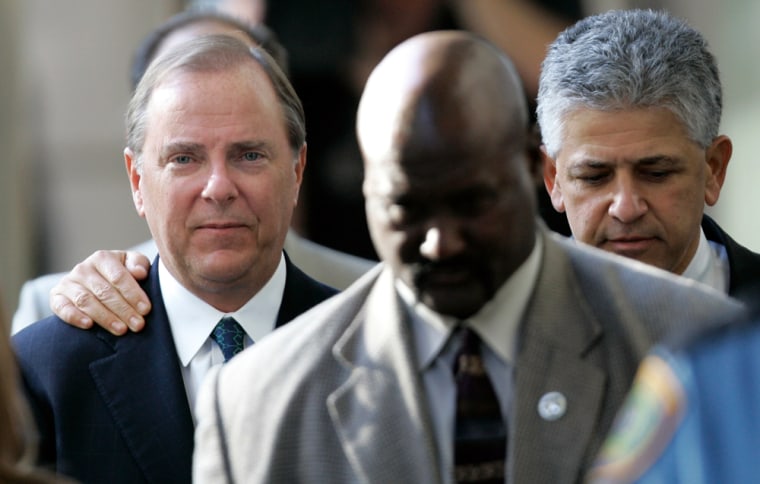Former Enron CEO Jeffrey Skilling’s nearly quarter-century prison sentence this week should remind corporate bosses everywhere of how risky it can be to break the law.
The timing couldn’t be more perfect. In recent months, dozens of CEOs have found themselves in trouble for manipulating the grant dates of stock options. That scandal hasn’t been a wrecking ball for business like Enron’s massive fraud, but it has thrown corporate ethics and accounting into question at more than 100 companies.
The lessons from both should be the same: Big trouble doesn’t start big, but comes when executives push the envelope too far to get what they want — which often means stronger earnings and fatter paychecks for themselves.
For Enron, the goal was to maintain an appearance of solid growth. Just a decade ago, that’s just what the Houston-based company was lauded for by everyone — investors, analysts, business leaders, the media, politicians. With soaring profits and a climbing stock price to match, Enron symbolized the “New Economy.”
Skilling was one of the hotshot executives leading Enron back then. They were smart, successful and determined to make Enron a winner — apparently at all costs. Enron’s triumphs stroked their egos and boosted their compensation.
But it turned out the growth story was a ruse. Enron, once the nation’s seventh-largest company, looked so good because it had built a web of fraudulent schemes that hid billions of dollars in debt and made ventures appear profitable.
Once that was discovered in late 2001, the Houston-based company crumbled into bankruptcy proceedings. That collapse wiped out thousands of jobs, more than $60 billion in market value and more than $2 billion in pension plan values.
“This was a crime of opportunity that built over time,” said Robert A. Mintz, a former federal prosecutor who now works at the Newark, N.J.-based law firm McCarter & English LLP. “It just became larger and larger until they had created an illusionary company.”
Skilling has long proclaimed his innocence, but a jury didn’t buy it. It didn’t help his case that former Enron finance chief Andrew Fastow, who was considered the mastermind behind the company’s fraud, pleaded guilty in 2004 and flipped on his old bosses. He is serving a 6-year sentence.
In late May, Skilling was convicted of defrauding investors and employees by repeatedly lying about Enron’s financial strength. Enron founder and former Chairman Ken Lay also was convicted during the same trial, but died weeks after that verdict.
On Monday, the 52-year-old Skilling was sentenced to serve 24 years and four months in prison, the harshest punishment by far in Enron’s scandalous collapse. He was also ordered to liquidate his remaining assets which total $60 million. About $45 million will be put in a restitution fund for investors and employees who lost money when Enron failed and $15 million will go to cover his legal fees.
As Mintz points out, what got Skilling convicted — and took down Enron — was that he and others went beyond just spinning the company’s financials in the most favorable light and instead chose to lie about the corporation’s health.
That way of thinking can easily be applied to the stocks options scandal. At issue for many companies is a technique known as “backdating,” which occurs when insiders look back in time for a low point in their company’s stock price so the exercise price of the options could be set at that ebb.
When companies backdate options, those benefiting can walk away with much bigger payouts while their companies don’t see a hit to earnings from huge compensation costs and get to pay lower taxes.
Like those at Enron, executives embroiled in the backdating scandal could have convinced themselves they were not at risk by partaking in such practices — even though it was creating fictitious financials.
“Most executives don’t say ’Let’s go loot the company today.’ It starts by cutting corners and that may lead to more cutting of corners and more cutting of corners,” said Peter Henning, a professor at Wayne State University Law School in Detroit.
Such practices are catching up with the offenders. More than 140 companies face government or internal probes on their stock-option practices, and more than 40 corporate officers, including the CEOs of UnitedHealth Group Inc., Monster Worldwide Inc. and CNet Networks Inc., have lost their jobs as a result.
Shareholders can only hope that the consequences of such bad behavior aren’t lost on future leaders who might try to ignore legal limits.
Anyone who doesn’t get it should ask Skilling about his post-Enron life.
